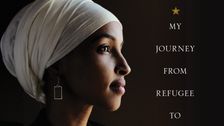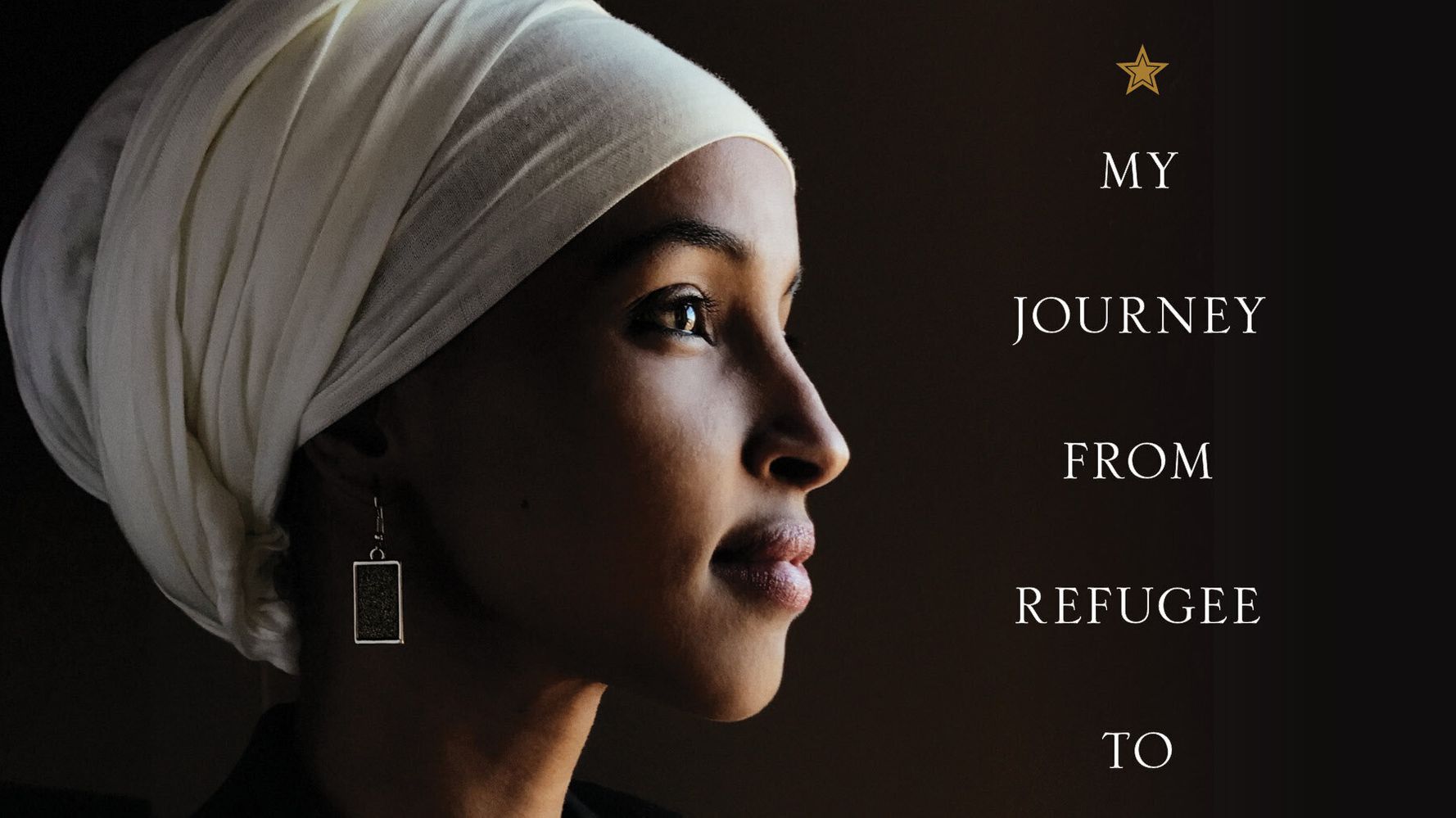[ad_1]

As a Black Muslim woman, and one in the public eye, Rep. Ilhan Omar (D-Minn.) is a frequent target of xenophobia, racism, and sexism ― sometimes all at once. She’s eager to do what she can to combat bigotry, and has turned her focus to police brutality since George Floyd, a Black man, died at the hands of a police officer in Minneapolis last month.
Omar wants to see her state lead the way for systemic change, while she pushes to do the same through Congress. Last week, she introduced four bills that would address police accountability by establishing a new federal agency aimed to investigate police misconduct, limiting the president’s ability to deploy troops against American citizens, and providing economic relief to those impacted in the wake of Floyd’s death and the subsequent protests.
As the first Somali-American elected to Congress and one of the two first Muslim women elected to Congress, Omar knows firsthand the impact policies have on marginalized communities. In her new memoir, “This Is What America Looks Like: My Journey from Refugee to Congresswoman,” published on May 26, Omar chronicles her life so far, including her time in Mogadishu, fleeing to a refugee camp, coming to the U.S. and, now, fighting for justice in Congress.
HuffPost spoke with Omar from Minnesota about her journey finding and fighting for a better America.
What has life been like for you, between the pandemic and the protests? (Note: On Monday, Omar said that her father died from complications of the coronavirus. This interview was conducted before her father’s death.)
It’s been really challenging. The public health crisis is still real. We’re still dealing with the coronavirus while still dealing with the economic crisis and pushing legislation to try to cancel rent and mortgages for people who are watching debt pile up as this pandemic continues.
In Minnesota, we’re slowly transitioning back to work and it’s a slow move. There were already a lot of people who were food insecure and now with the destruction of food places and many of the places where people would get their essential needs, we are doubling up our efforts and helping with food distribution and essential items. We turned my campaign headquarters and our parking lot into a distribution center.
So the work is still happening. The pain and the hurt and the devastation has compounded. It’s a very challenging time for us here in Minneapolis.
You share stories about resilience, ranging from fleeing Somalia and being bullied at school once in America. In the memoir, you write, “Fighting didn’t feel like a choice. It was a part of me. Respect goes both ways.” How has being a fighter prepared you for your time in Congress?
I really work hard to introduce legislation that has a 360-degree lens in solving social and economic problems. The legislation we’ve introduced have all been comprehensive. The fighter aspect in me believes it is important for us to lay down the seeds today so we can eat the fruits tomorrow. The ability to also build relationships and be courageous in the rooms that I’m in has allowed us to have the highest numbers of amendments in committee and on the floor as a freshman and as the Minnesota delegation in Congress.
I’m someone who has always had trials and triumphs run in parallel. As many difficulties as I have had in walking in the halls of Congress, I’ve also had really unique successes for a freshman.
I couldn’t help but laugh at the scene on Capitol Hill before you were sworn in and a member of the Capitol police mistook Connor McNutt, your white male chief of staff, for the elected official and didn’t acknowledge you. Why do you think someone like you, a Black, Somali, hijab-wearing Muslim woman in Congress was so unfathomable for someone like him?
Here is someone who is in charge of our safety. So you know he’s got pictures and supposed to have an actual understanding of who he’s supposed to be briefing but his subconscious has not allowed for him to recognize me as a congresswoman and that is strange cognitive dissonance.
It’s sort of like what our Black president used to experience and I’m sure that experience was also true for some of the first Black people or Latino people who were elected.
It’s just an ability to think who should be there and when you’re confronted with something different, your brain struggles to recognize that this is like the reality of the moment. I think for those people who struggled with seeing change, they are also struggling in having my presence in Congress.
I don’t know when a nation like ours that has gone through what it has been through would ever be ready to actually see a very visible Muslim woman, let alone one that comes from one of the countries that are on a Muslim ban and that the president describes as a “shithole” country.
In your memoir, you write that an individual can’t decide whether or not “to engage in an issue because it’s too controversial.” In the wake of George Floyd’s death, there have been increased calls to tackle police brutality and racism in controversial and bold ways, including calls to defund the police. What policing reforms and changes do you want to see? Do you think your state can lead the way with those changes?
Certainly. I’ve always believed that when we have the opportunity to create transformative change we should. We find ourselves here in Minneapolis in a moment where that opportunity exists and we can push for transformative change.
We’re going to have to work on dismantling police departments because there is a crisis in confidence. There is no amount of reform that will restore that.
Rep. Ilhan Omar
Now we have certain policies that we are going to review on a state level and a municipal level in Minneapolis. We’re going to have to work on dismantling police departments because there is a crisis in confidence. There is no amount of reform that will restore that. This is our opportunity to reimagine what public safety looks like for our community and what the role of community-led initiatives should be in dealing with substance abuse and homelessness and crime prevention and gang violence prevention and domestic violence prevention. This is our chance to really look at the kind of social and economic neglect at this moment, holistically.
I think the nation also has that opportunity. But what we do here in Minnesota would give the nation the opportunity to have a vision for what is possible. I’m actually really proud of many of the city council members here, who are who have the moral clarity and the courage to push for serious systematic change.
You also mentioned in your book a moment where you asked yourself how to “maintain your ideals and outspokenness while remaining respectful to your colleagues.” Have you found an answer to that, especially in the Democratic party where the establishment and progressive often have very different views and ways of doing things as a party?
I grew up in a large family and we encouraged discussion and debate. At a young age, I learned that’s really healthy. With my colleagues, I always can understand their point of view and how they find themselves in the positions that they are in when it comes to advocacy.
There’s always a disconnect in the way in which I operate and the way in which my voice gets sensationalized. I’m a consensus-builder and someone who tries to find a place of agreement with people. So I can have respect and admiration for people who don’t share many of the progressive values that I have or the views that I have. Internally, a lot of my colleagues have a closer relationship with me because of that, and that is the root of my success and in being able to have the legislative successes we’ve been able to have.
When you arrived in the U.S., you were shocked at the trash-filled NYC you landed in and your dad tried to reassure you by telling you, “This isn’t our America. We’ll get to our America,” as you share in your memoir. Did you find your America yet?
My worry throughout the years has been that the level of complacency that I’ve seen would lead to there only being incremental changes and not transformative change.
I’m inspired by historic demonstrations that are taking place in nearly all 50 states and I think we will see serious, serious policies that will address the economic and social neglect that will address the systematic racism that is codified in many of the policies that govern our country.
I am hopeful because of the new voices that are emerging that are mainly young and diverse groups of people who are really good at creating coalitions across the country to fight for bold changes. I know the legislation we’ve been able to introduce and have hearings for in the last few weeks would not have been possible without them.
I also know that the kind of commitment we have from the Minneapolis City Council in dismantling our police department would not exist without them. I know that the transferring of the George Floyd case to Keith Ellison as the lead attorney general would not have happened without them
The rapidness in which change is happening is really promising and I can see for the first time, an America where people are housed, where there is no childhood hunger. An America where people have equal access to their constitutional rights. An America where you’re not surveilled and vilified because of your religion or race. An America where we are actually living up to our ideals and an America where we actually live in the truth of what we have been exporting throughout the world for many years.
Calling all HuffPost superfans!
Sign up for membership to become a founding member and help shape HuffPost’s next chapter
[ad_2]
Source link

